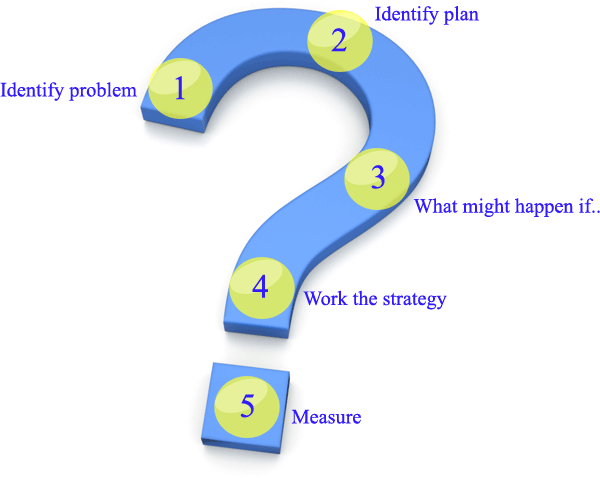Weekly Investment: Problem Solving Approach
Weekly Investment: Problem Solving Approach
Problem Solving Lessons are the focus of this week's weekly investment. To help better understand them as a cohort we have begun looking into different styles of teaching them. To better understand problem solving approach to lessons let me ask the problem:
Why are these kinds of lessons so successful?
Problem Solving Lessons are great to introduce topics to students. For our usage we categorizes problem solving approaches into four categories:
- Forked Road
- Multiple Possibilities or Factors
- Situation to be Improved
- Effect / Cause
1. Forked Road
Should I Cull or Breed an animal?
Should I go to class or not go to class? (A daily challenge for most college students)
Should I watch Penn State Football or should I watch Penn State Football?
These questions need to be designed with one of two answers but what is most important is that students are ready to answer them.
These kind of problem solving questions take some time to formulate a question but can also be completed relatively easy.
I like to consider these the lowest level of problem solving questions.
2. Multiple Possibilities or Factors
The way I best understand this group of problems is you give them a scenario and you ask the question "Which". These kinds of questions are pretty cool. One good one to help me focus is thinking about the Berkley Creamery. Often I ask myself which Milkshake should I get today. Other good examples are: Which Plants should we plant in the greenhouse? Which/What flowers should we get to make our arrangements? Which stallions should I keep intact?
3. Situation to be Improved
 So this one is a little more confusing I'll give you that. Instead of thinking past a situation is more looking at "How" the situation occurred. So take for example a quality assurance complaint you are tasked with identifying the source and how to stop it. Or maybe you are looking at an animal and trying to figure out How it went lame? Or how come there isn't a lot of food for the FFA party?
So this one is a little more confusing I'll give you that. Instead of thinking past a situation is more looking at "How" the situation occurred. So take for example a quality assurance complaint you are tasked with identifying the source and how to stop it. Or maybe you are looking at an animal and trying to figure out How it went lame? Or how come there isn't a lot of food for the FFA party?This one focuses more on the well how did this come about?
4. Effect / Cause
This is what I would consider the higher end thinking of a problem solving strategies. Also called cause/effect as well. This category is all about the "Why" questions. Why is the engine not working? Why are the plants dying? Why is the ice cream crystallizing? These questions pose a question which will take time and prior knowledge to succeed. To solve this kind of question you also have to ask other questions as well where as in other scenarios you already kind of know the answer to it. These are the hardest kinds of questions to try to answer if you don't have previous knowledge. These are also pretty useful for students to answer and can make them feel pretty rewarded as well.I think the best way to approach problem solving questions is to consider the many ways you can ask a question. From there determine the length or challenge you want involved in the question. From there determine what else do they need? After that make the students feel successful. Its key that you do this to make it a great lesson. Personally I think I like the idea of a student trying to determine the cause and then from there finding a possible solution.




George, you did an awesome job breaking down each of the PBL strategies and including examples for how they could be used in the ag classroom! What challenges do you anticipate with the implementation of each one? Thanks for doing such a great job making PBL relevant to ag!
ReplyDeleteThis is a good resource to keep the problem solving approach framework in mind! We also read about Project based Learning, how will you incorporate that into some of your lessons?
ReplyDeleteWow! I learned so much from your blog post! Great examples to make it ag related, it made the topic way more tangible... Remember that for student teaching!
ReplyDeleteInteresting, George! I like how you took the time to go through each of these. I found that this week in lab I was still having a bit of a hard time finding when they start in people's particular lessons. Do you have any tips?
ReplyDelete